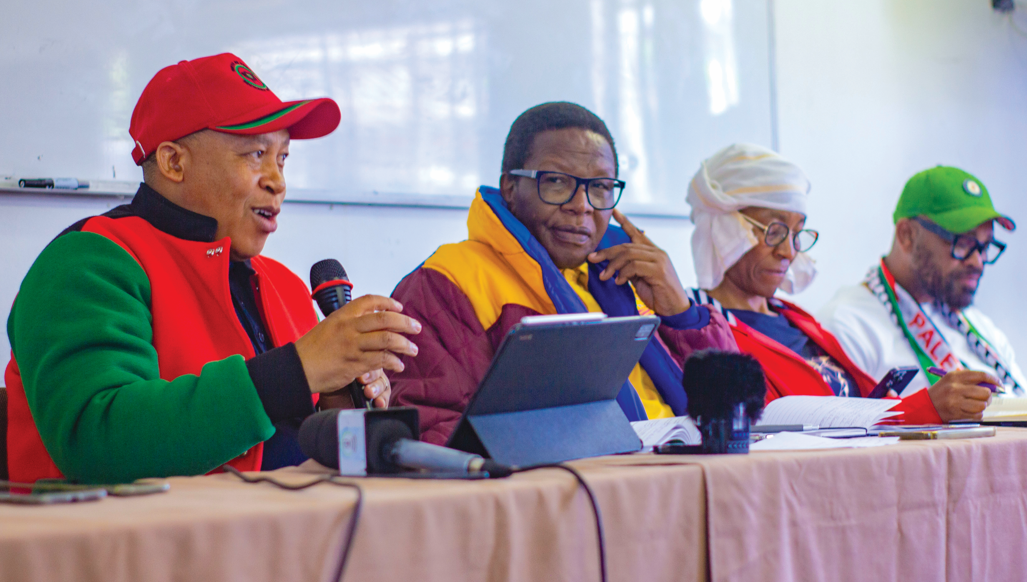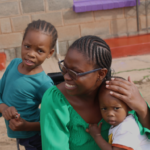The opposition parties have revived calls for Lesotho to become part of a federal state with South Africa, as debates about Basotho’s “conquered territory” and the plight of migrants across the border continue to dominate public discourse.
Speaking for opposition parties this week, Leader of Opposition Mathibeli Mokhothu said that federating Lesotho with South Africa could be an option worth exploring. He argued that such a move could not only strengthen Lesotho’s claim to its historic territories but also provide protection for Basotho living and working in South Africa.
The issue has gained traction in recent months, largely driven by incarcerated Basotho Covenant Movement (BCM) leader Tšepo Lipholo, who has been vocal on the demand for Lesotho’s lost territory to be restored.
Mokhothu said Basotho continue to face daily humiliation across the border, citing xenophobic attacks, denial of healthcare services, and harassment from groups such as Operation Dudula. He accused Prime Minister Sam Matekane government of “neglecting” Basotho in South Africa, warning that opposition parties would petition the Southern African Development Community (SADC) and the United Nations (UN) if both Matekane and South African President Cyril Ramaphosa continue to fail in protecting Basotho citizens.
“We will push this government to intervene. The suffering of Basotho in South Africa cannot be ignored any longer,” Mokhothu said, also demanding free movement between the two countries and special identification documents to ease travel.
A federal state is a system in which two levels of government share power: a central authority and individual states. Each level has its own powers to make laws, enforce them, and manage certain affairs independently. Examples in Africa include Nigeria, Ethiopia, among others, while overseas examples include the United States, Canada, Germany, and India.
Advocates argue that federalism balances unity and diversity, and allows states to maintain local autonomy while benefiting from a stronger central framework.
Critics, however, warn it can create tensions over resource control and governance.
The idea of Lesotho joining South Africa in a federal arrangement is not new. Former South African Finance Minister Tito Mboweni has previously stirred public debate by suggesting Lesotho, Eswatini, and Botswana should be federated with South Africa to build a stronger economic bloc.
Similarly, in Lesotho, different political voices over the years have toyed with the idea of federation, often linking it to calls for reclaiming Basotho land annexed under colonial treaties.
Some commentators argue that the idea of a regional federation involving South Africa and its smaller neighbours is not new. They point to the 1955 Freedom Charter, a cornerstone of South Africa’s liberation struggle, which anticipated that the people of Botswana, Lesotho, and Eswatini would one day be faced with the choice of whether to unite with a democratic South Africa or pursue their own separate paths.
The charter explicitly declared: “The people of the protectorates—Basutoland, Bechuanaland and Swaziland—shall be free to decide for themselves their own future.”
According to these commentators, this vision has never been realised. When South Africa achieved democracy in 1994, no structured process was initiated to consult the people of Botswana, Lesotho, and Eswatini on whether they wished to form some kind of federation, confederation, or remain entirely independent. Instead, the status quo was maintained, and the question of regional integration was left hanging.
They argue that this unfulfilled aspiration resurfaces repeatedly in public debates, particularly in Lesotho, where issues of sovereignty, migration, and deep economic dependence on South Africa remain pressing. The high levels of cross-border movement for work, trade, and education, alongside Lesotho’s reliance on the South African economy and infrastructure, keep the federation debate alive.
Critics say the question is not just historical but is tied to present realities: whether deeper political and economic integration could offer solutions to chronic instability, unemployment, and poverty in Lesotho, and by extension, in the wider region.
Currently, thousands of Basotho face uncertainty as their South African work permits near expiry. In 2023, South Africa granted exemptions to 54,653 Lesotho nationals, but those permits lapse on 29 November 2025. Earlier arrangements like the Lesotho Special Permit (LSP) and the Lesotho Exemption Permit (LEP) have also expired or been phased out, leaving migrants vulnerable.
Mokhothu accused Matekane’s government of failing to secure a lasting migration framework with Pretoria, even after the two countries held Bi-National Commission (BNC) meetings in 2023 and 2025. While temporary visa relaxations were introduced, including a 90-day stay arrangement, many Basotho still face hostility. Recently, South African transport operators clashed with their Lesotho counterparts, barring them from ferrying passengers across the border.
“This government has failed to build strong ties with South Africa,” Mokhothu charged. “We will engage with this matter deeply and from every angle. We are knocking at the heart of Prime Minister Matekane.”
Summary
- The opposition parties have revived calls for Lesotho to become part of a federal state with South Africa, as debates about Basotho’s “conquered territory” and the plight of migrants across the border continue to dominate public discourse.
- He accused Prime Minister Sam Matekane government of “neglecting” Basotho in South Africa, warning that opposition parties would petition the Southern African Development Community (SADC) and the United Nations (UN) if both Matekane and South African President Cyril Ramaphosa continue to fail in protecting Basotho citizens.
- They point to the 1955 Freedom Charter, a cornerstone of South Africa’s liberation struggle, which anticipated that the people of Botswana, Lesotho, and Eswatini would one day be faced with the choice of whether to unite with a democratic South Africa or pursue their own separate paths.

Your Trusted Source for News and Insights in Lesotho!
At Newsday Media, we are passionate about delivering accurate, timely, and engaging news and multimedia content to our diverse audience. Founded with the vision of revolutionizing the media landscape in Lesotho, we have grown into a leading hybrid media company that blends traditional journalism with innovative digital platforms.








